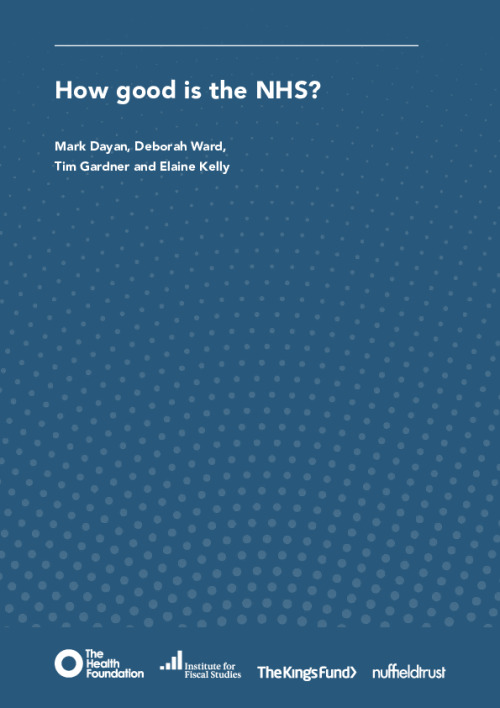As a defining part of life, politics and society in the UK, there has long been extensive interest in measuring the successes and failures of the NHS. The Commonwealth Fund, a US charity, made headlines when it declared the UK health service to be the world’s best health care system, in a ranking based on global polling of patients and staff. The important data on health care standards and resources collected and published by the OECD, the organisation which brings together 35 wealthy countries, has been widely discussed and debated. Our four organisations have all looked in different ways at how the health service stacks up in terms of funding, staff and quality.
This report aims to take a broad, up-to-date view which draws on all these sources of data as well as on work and knowledge within our organisations, and discussions with experts in particular health conditions. It looks at three aspects of what we might mean by a good health care system: the speed and accessibility of care, the efficiency of the system and the outcomes delivered for patients. It also sets the scene by looking at what the health service has to work with, so that we can consider whether it is doing a good job given the circumstances. In each field we compare the NHS to its peers: health care systems in countries belonging to the same categories of high-income, industrialised countries as the UK.
Key findings
- Overall, our analysis shows that the NHS performs neither as well as its supporters sometimes claim nor as badly as its critics often allege. Compared with health systems in similar countries, it has some significant strengths but also some notable weaknesses.
- Its main weakness is health care outcomes. The UK appears to perform less well than similar countries on the overall rate at which people die when successful medical care could have saved their lives.
- Although the gap has closed over the last decade for stroke and several forms of cancer, the mortality rate in the UK among people treated for some of the biggest causes of death, including cancer, heart attacks and stroke, is higher than average among comparable countries. The UK also has high rates of child mortality around birth.
- Among its strengths, the NHS does better than health systems in comparable countries at protecting people from heavy financial costs when they are ill. People in the UK are also less likely than in other countries to be put off from seeking medical help due to costs.
- Waiting times for treatment in the UK appear to be roughly in line with those of similar countries and patient experience generally compares well. While data is limited, the NHS seems to be relatively efficient, with low administrative costs and high use of cheaper generic medicines.
- The NHS appears to perform well in managing certain long-term illnesses, including diabetes.
- Health care spending in the UK is slightly lower than the average in comparable countries, both in terms of the proportion of national income spent on health care
and in terms of spending per person. - The UK has markedly fewer doctors and nurses than similar countries, relative to the size of its population, and fewer CT scanners and MRI machines.










